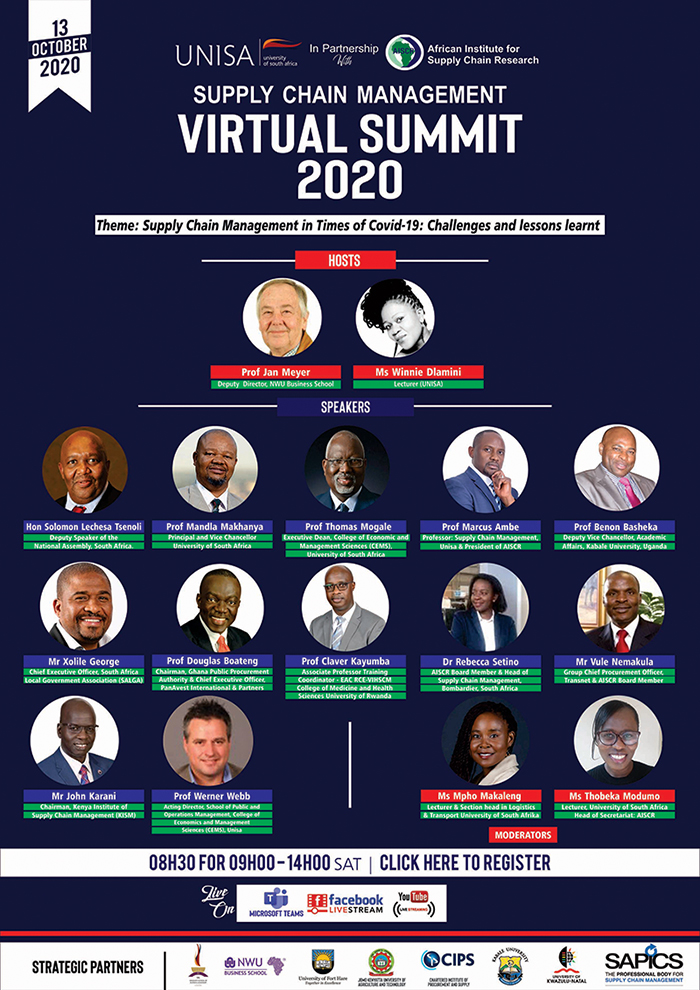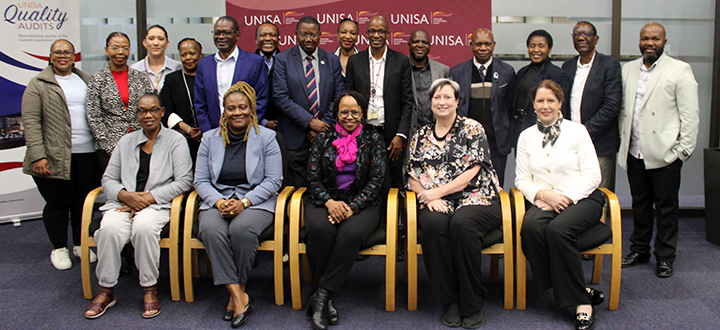College of Economic & Management Sciences
Erosion of capacity contributes to corruption
The erosion of the internal capacity of the state and at state-owned companies such as PRASA and SAA has contributed to corruption, the Deputy Speaker of the National Assembly, Lechesa Tsenoli, said in his keynote address at a summit hosted digitally by the African Institute for Supply Chain Research (AISCR) at Unisa on 13 October 2020.
A number of prominent speakers from all over the continent, including Kenya, Uganda, Ghana and Rwanda, participated in the virtual event. The theme of the summit was "Supply chain management in times of Covid-19: Challenges and lessons learnt".
According to Tsenoli, the PRASA locomotion debacle illustrates what is wrong with undermining localisation initiatives. "We have capacity in the country to build locomotives, yet imports became the convenient solution to people who abruptly outsourced tenders from which they profit corruptly," he said.
The same happened at SAA where they had the capacity to provide services to many other companies. The erosion of the internal capacity, however, gave private firms an opportunity to fill this gap. This, in turn, has led to increased costs and a dependency on external goods and services.
The country was already in an economic crisis by the time the Covid-19 pandemic and the lockdown arrived. This provided an opportunity to rethink and correct the course. Unfortunately, as soon as the resources available were announced, some took advantage of the situation to serve their personal interests and make a quick buck, he said.
Those who received the tenders without prior determination of their capacity immediately outsourced to existing firms, which led to fronting and price escalation. While the Covid-19 corruption is very embarrassing, it also provides an opportunity to learn from our mistakes.
The role of people who are given responsibility for the use of public resources should ensure we get value for money. This should include robust oversight over supply chain management. If this lapses it creates opportunities for thieves to thrive. Public money is for development. We need to recognise that and act appropriately, Tsenoli concluded.
State of disaster opened the floodgates of corruption
The state of disaster or emergency have opened the floodgates for rampant corruption, Prof Mandla Makhanya, Principal and Vice-Chancellor of Unisa (VC), said at the AISCR summit.
While economies are collapsing or under threat, businesses are going under, people are retrenched by the millions, and many have been left hungry and homeless, there has been a deluge of profiteers who have taken advantage of the gaps offered. These corrupt individuals or syndicates seized the opportunity to sell banned goods on the black market at massively inflated prices or selling (and not delivering) substandard products such as personal protective equipment.
The VC argued that effective supply chain management demands consistent governance, proactive improvement and ongoing vigilance. The lure of easy money through corruption demands ongoing vigilance from supply chain managers.
This is as destructive as it is demoralising, and it has been an extremely painful lesson to learn.
"We have a long way to go to inculcating a level of citizenship that goes beyond the individual to consider the collective," he said.
We need to assess and mitigate strategies. It must lead to a different way of doing things, Prof Thomas Mogale, Executive Dean of the College of Economic and Management Sciences (CEMS), told the attendees in his welcoming address. CEMS hosts AISCR and also offers a range of qualifications in supply chain management - a flagship qualification in the Department of Applied Management. This is the college’s contribution to advancing supply chain management on the African continent, he affirmed.
You can watch the event on MS Teams:
* By Ilze Crous, Communication and Marketing Specialist, College of Economic and Management Sciences
Teaser image sourced from parliament.gov.za
Publish date: 2020/10/20


 Research with impact – moving beyond bean-counting
Research with impact – moving beyond bean-counting
 Exploring resources to mitigate the digital divide in rural areas
Exploring resources to mitigate the digital divide in rural areas
 Unisan in the home straight at the NSTF-South32 Awards
Unisan in the home straight at the NSTF-South32 Awards
 Unisa LIS reflect on successful 2025 external peer review
Unisa LIS reflect on successful 2025 external peer review
 Entrepreneurs shine during Unisa’s Start-Up Day
Entrepreneurs shine during Unisa’s Start-Up Day